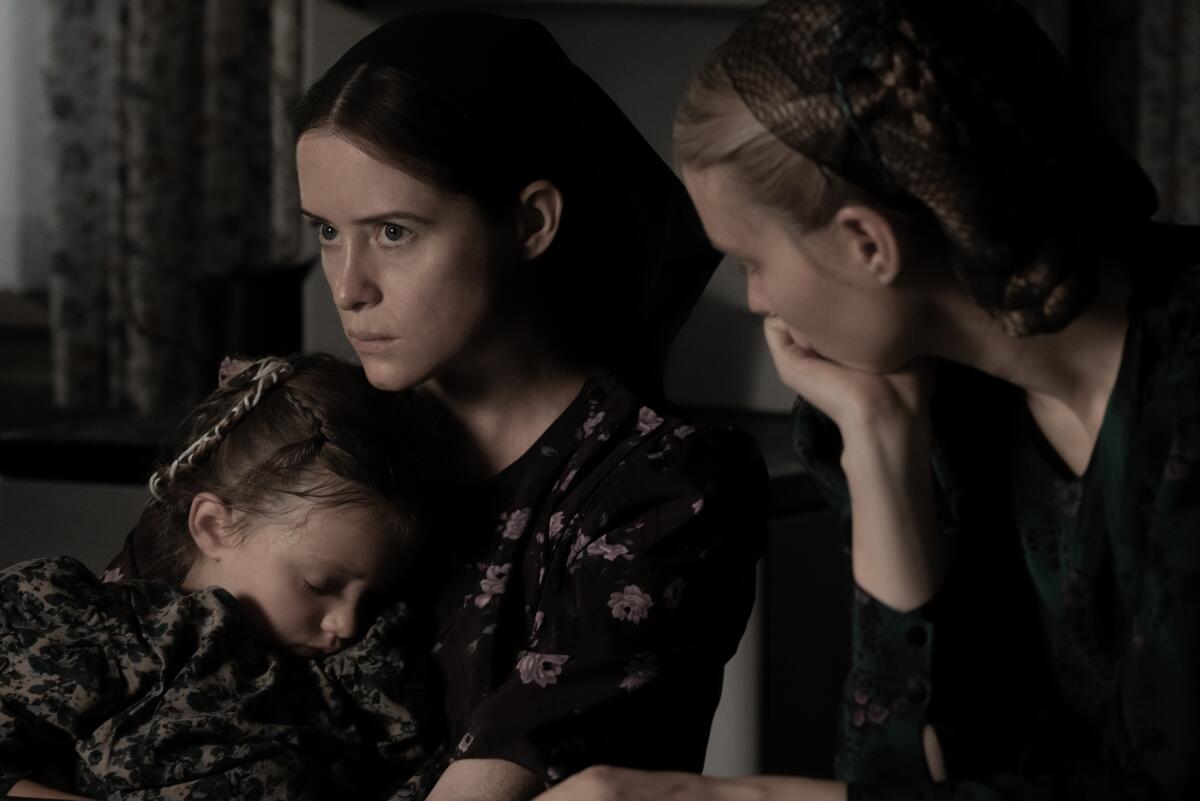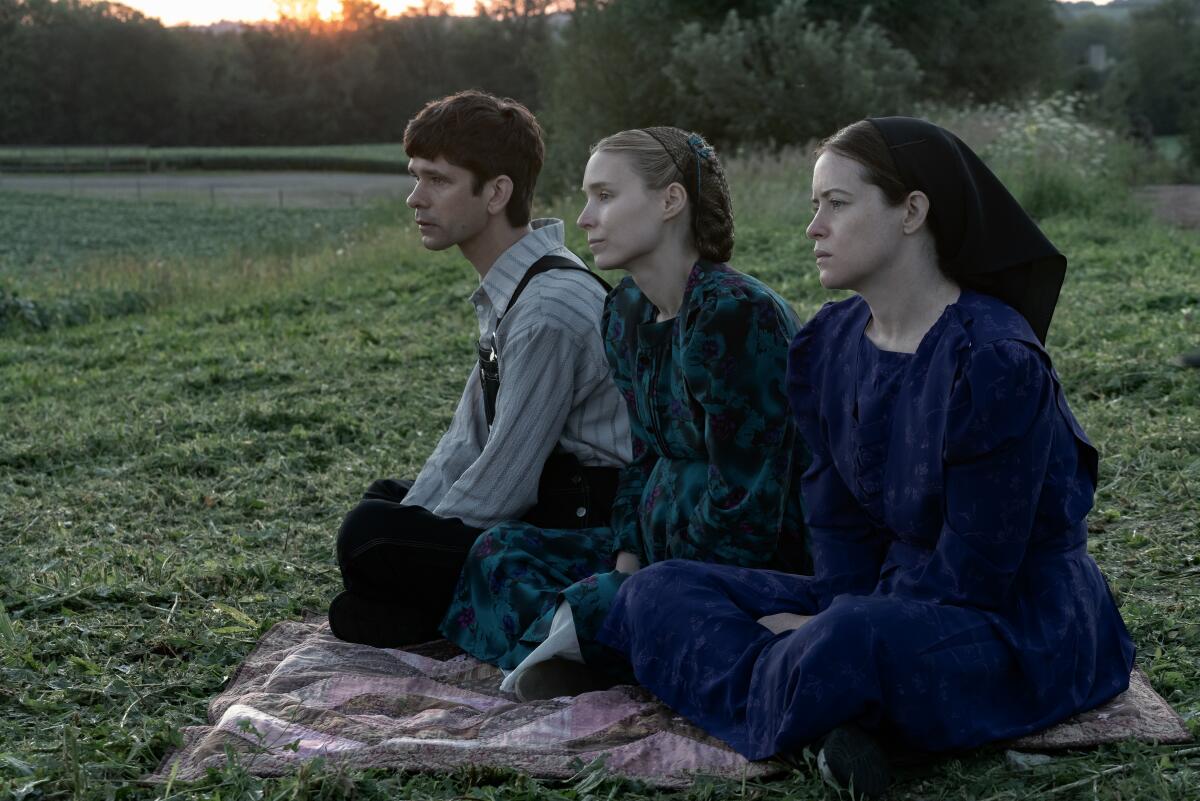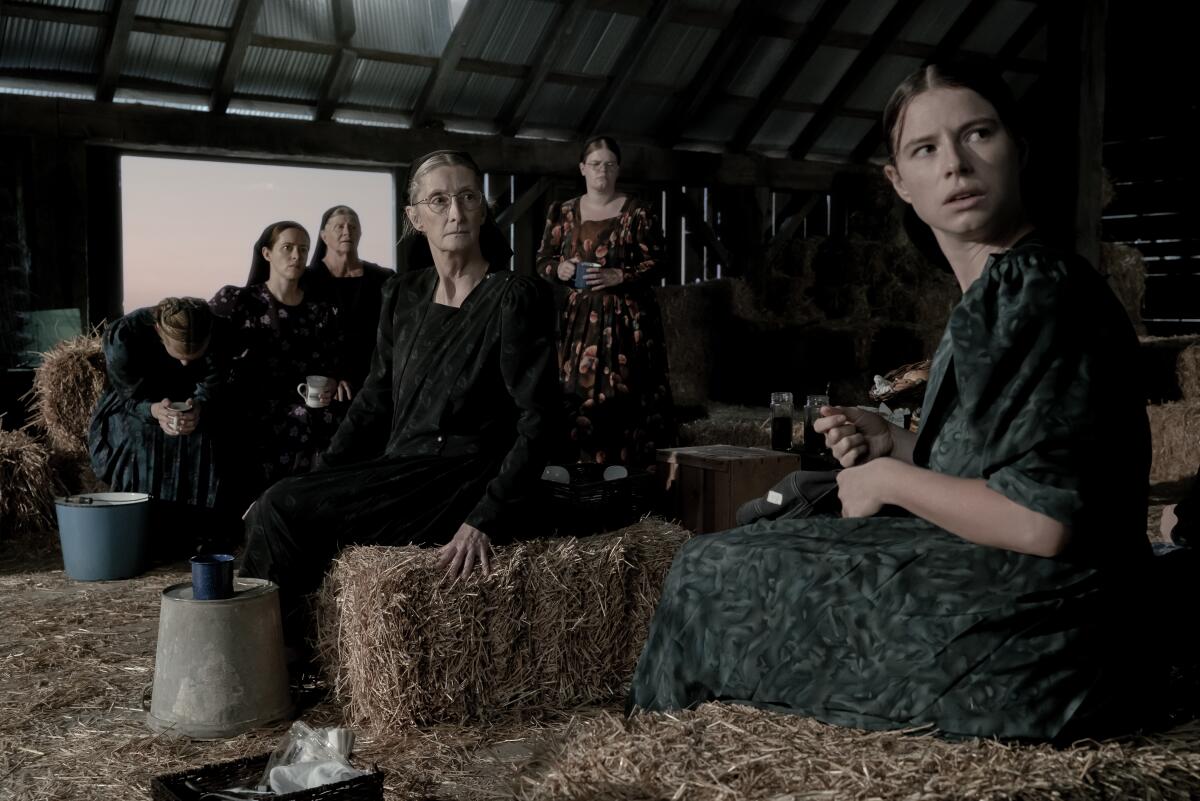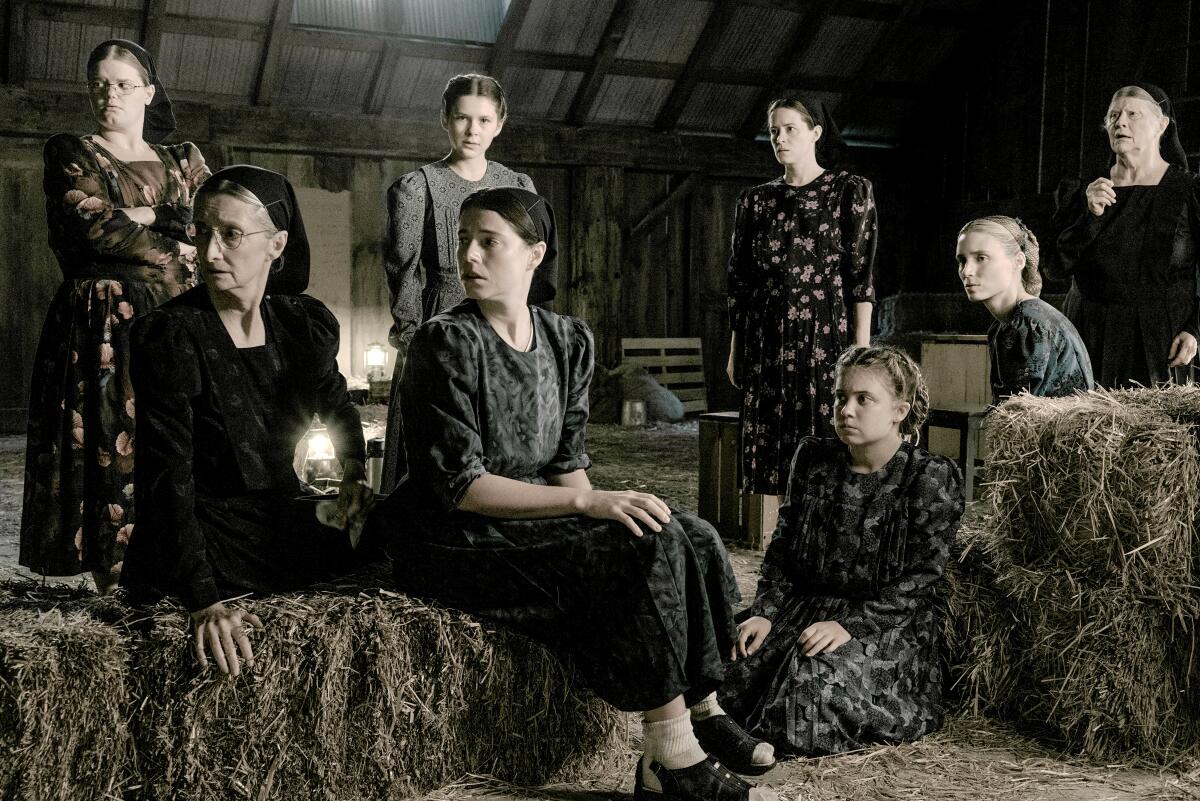Ensemble acting doesn’t get much better than in Sarah Polley’s brilliant ‘Women Talking’

- Share via
For much of “Women Talking,” Sarah Polley’s suspenseful and galvanizing fourth feature, we are in the hayloft of a barn overlooking a remote stretch of farmland, with a lonely dirt road winding toward the horizon. The sunlight spilling in through the window seems to beckon to the eight women who have gathered here to think, rage, plan, argue and, yes, talk — about the abuses they’ve suffered and the impossible decision that awaits them. As the shadows lengthen and the conversation intensifies, the light also seems to fall gently on each speaker in turn, as though illuminating them from above or even within. Whoever might be wielding this light — be it the God they worship or the director behind the camera — these women have their full attention, and also ours.
Skillfully adapted by Polley from the 2018 novel by Miriam Toews, “Women Talking” unfolds in the aftermath of a sustained campaign of sexual violence. Over two years, several Mennonite men have raped more than a hundred women and young girls in their remote colony, drugging them with cattle tranquilizer and then assaulting them in their beds. The rapists, unidentified until recently (a male elder had attributed the attacks to evil spirits), have been jailed in a nearby town; the other men, complicit in spirit if not in deed, have gone to bail them out, leaving the women alone with just 24 hours to determine their response. Should they forgive the men, as their Christian beliefs would seem to demand? Should they respond with their own physical violence or pack their things and leave the colony?
For your safety
The Times is committed to reviewing theatrical film releases during the COVID-19 pandemic. Because moviegoing carries risks during this time, we remind readers to follow health and safety guidelines as outlined by the CDC and local health officials.
Toews, a Canadian writer of Mennonite descent, based her story on real-life events that came to light in a Bolivian colony in 2009. Polley’s movie, though set in roughly the same time frame, consciously untethers itself from specifics. The story might as well be unfolding a hundred years earlier, or a hundred years later. The women, superbly played by English-speaking actors in plain dresses and kerchiefs, give no indication of the setting. The harsh, desaturated look of Luc Montpellier’s cinematography — not quite black-and-white, not quite sepia — establishes an ambiance of persistent, disorienting unreality. This world may be rooted in soil, in fields where children run and play and in roads traveled by horse-drawn buggy, but it also occupies a slippery zone between the concrete and the allegorical.
And also, perhaps, between the theatrical and the cinematic. You can imagine this material working well onstage, given its ticking-clock premise, its spare production design (by Peter Cosco) and its intimate study of group dynamics — all of which speaks not to the rigidity but rather the fluidity of Polley’s filmmaking. Her playfulness of form, much like her insight into the hearts and minds of women at a dramatic crossroads, is hardly a new quality in her work (“Away From Her,” “Take This Waltz”). Her ingeniously structured 2013 documentary, “Stories We Tell” — a title that sounds like an echo of this movie’s — was the product of an adventurous and democratic sensibility, alive to the dizzying complexities of narratives and of the storytellers who spin them.

“Women Talking,” though seemingly more straightforward, abounds in its own furiously contradictory points of view. Consensus seems impossible, even among the eight women — grandmothers, mothers and daughters from two different families — who have been elected to make a collective decision. One woman, Scarface Janz, removes herself early on, believing there’s nothing for them to do or discuss. Since she’s played by Frances McDormand, the most famous face in the cast and an actor who could disembowel the patriarchy in her sleep, the abruptness of her departure feels particularly pointed. It leaves you thinking about the kind of movie “Women Talking” might have been and determinedly refuses to become.
The other women inspire similar speculation. Left to her own devices, Salome (a forceful Claire Foy) would surely tilt the story in the direction of a satisfyingly bloody revenge thriller. Against the counsel of her peacemaking mother, Agata (Judith Ivey), and her sister, Ona (Rooney Mara), she vows to destroy the men responsible — her 4-year-old daughter is one of the survivors — and dares God to hold her accountable. Salome’s angriest adversary, Mariche (Jessie Buckley, in an exposed wound of a performance), insists that they stay and carry on. But as we catch glimpses of her own private domestic drama — her abusive husband is one of several off-screen villains — it’s clear that nonresistance would only perpetuate a different kind of violence.
Mariche’s learned acceptance of male brutality explains her dislike of August (a deeply vulnerable Ben Whishaw), a shy, sensitive schoolteacher who’s been asked to attend and take the minutes of the meeting. None of the women have been taught to read or write — a reminder that the dehumanization of an entire sex, far from being an aberration in this colony, is enshrined in its very laws and traditions. August could hardly be more sympathetic to the women’s plight, but he is also informed of the uselessness of his sympathies. He is there to record rather than participate in the discussions, which proceed with a mix of impatience, awkwardness, tension, fury and occasional comic relief.

Mariche’s mother, Greta (a wonderful Sheila McCarthy), speaks with droll conviction about the lessons she’s learned from her two horses. Greta’s other daughter, Mejal (Michelle McLeod, piercing), suffers fits triggered by her memories of assault, and offers a chastening reminder that even a shared trauma manifests itself in unique ways. The youngest attendees, Autje (Kate Hallett) and Nietje (Liv McNeil), are as bored as you’d expect two adolescents to be, and their giggly interruptions relieve the tension and perhaps the audience’s own impatience. But I never felt impatient with “Women Talking,” which dismantles the assumption that conversation is an inherently dull or uncinematic activity, and which moves too swiftly to bog down in its own verbiage.
At times you may actually want the movie to slow down, to take on a messier conversational rhythm, rather than pivoting as cleanly as it does from one point to the next. What Polley achieves here is an artful, incisive distillation of Toews’ arguments, effectively if somewhat visibly engineered for clarity and brevity. (Part of me longs to see a longer-winded four-hour version; it could be unbearable, or a masterpiece, or both.) Even so, you’ll find yourself leaning forward in your seat, the better to drink in a conversation rich in metaphors and dissections of metaphors, in semantic arguments, theological digressions and parabolic asides.
There is no shortage of rhetorical force — or sharp, acerbic humor — to be harvested from these ideas, but Polley never lets the dialogue tilt too far into abstraction. “Women Talking” may be something of a thought experiment (it bills itself early on as “an act of female imagination”), but the stakes and consequences are hardly theoretical. While Polley wisely keeps the assaults off-screen, she layers in quick, subliminal cuts to bloodied sheets and bruised thighs; she wants us to know what it would cost the women to even consider the act of forgiveness, let alone embrace it. She also shows us — in quick, dreamlike glimpses of once-happy homes and children at play, often accompanied by Hildur Guðnadóttir’s beautiful score — what it would cost them to leave this world behind.

That last option is both the most terrifying and the most exciting possibility. And in articulating that possibility, Ona, played with a haunting inner radiance by Mara, quietly assumes the movie’s moral center of gravity. For Ona, who’s unmarried and pregnant from one of the assaults, leaving the colony would in some ways be a blessing. It could also deny her a possible future with August, who loves her deeply, and whose restless, questioning mind is very much the equal of hers.
The awakening of that mind and others in this community — of a collective consciousness powerful enough to reshape the world or at least a small patch of it — is partly what “Women Talking” is about, and the attentive viewer can’t help but imagine what their own epiphany might look like. But the movie also knows that allegory has its limits, and that this story, for all its easily seized-upon #MeToo resonance, deals with forces that have no obvious equivalent in modern, predominantly secular society.
You may catch glimpses of yourself in the characters’ faces: in Salome’s rage, in Mariche’s despair, in Greta and Agata’s authoritative calm. But if the actors have done their jobs well, and they have, you will also be reminded that empathy and recognition, much like forgiveness and trust, are two very different things.
The very idea of forgiveness can feel anomalous and even alien in this context, and Polley’s commitment to exploring the idea, with its explicitly Christian underpinnings, is but one measure of her movie’s integrity and quiet radicalism. When Ona declares at one point that “forgiveness is better than revenge,” many in the audience will surely disagree, and I suspect Polley would be disappointed if they didn’t. That may be why the closing passages of “Women Talking,” thrilling and wrenching in equal measure, feel like a beginning and also an invitation. The conversation ends with the expectation that the next word, if hardly the last, will be yours.
‘Women Talking’
Rated: PG-13, for mature thematic content including sexual assault, bloody images and some strong language
Running time: 1 hour, 44 minutes
Playing: Starts Dec. 23 at AMC the Grove 14, Los Angeles; AMC Century City 15
More to Read
Only good movies
Get the Indie Focus newsletter, Mark Olsen's weekly guide to the world of cinema.
You may occasionally receive promotional content from the Los Angeles Times.









